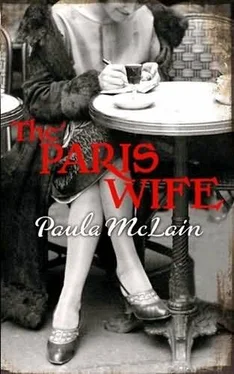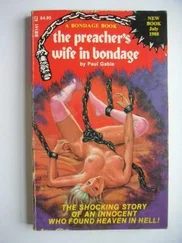“I don’t know about that,” he said, and began working immediately. I had no idea what he really had in mind, or how quickly he would cast it off. Within two weeks he had an entire draft of The Torrents of Spring , a parody-satire of Sherwood Anderson’s latest book, Dark Laughter . But having written the thing didn’t make the next step any easier. He wasn’t sure what he had or whom to let in on it. Someone might get the wrong idea and think it mean-spirited.
“I’d love to read it,” I said. “I can keep an open mind.”
“Sorry, Tatie. I’m not sure you can.”
“Is it that bad?”
“I can’t say. I’m going to show it to Scott and maybe Dos, too.”
Unfortunately, they weren’t at all keen on the project and told him to leave well enough alone. Anderson’s book might well be silly and sentimental, they agreed, but he was a great talent and had done so much to secure Ernest’s future, it wouldn’t be fair to lambaste the man. What would be the point?
“The point,” Ernest said, “is that his book is rotten and deserves to be harpooned, and if someone’s going to do it, why not a friend?”
“That’s a damned funny way to see it,” Scott said. “I tell you, lay off.”
Undeterred, Ernest had taken the manuscript over to the Murphys’ apartment and read it aloud while Gerald tried very hard not to be shocked, and Sara fell asleep sitting straight up on the sofa in a pale silk dressing gown. I listened with slow-growing dread. When Ernest finished, Gerald cleared his throat several times and, ever the diplomat, said, “It’s not for me, but someone might think it’s just the thing.”
“You’re killing me,” Ernest said.
Gerald turned to me. “What do you think, Hadley? You’ve a good head on your shoulders.”
“Well,” I hedged. “It’s not entirely kind.”
“Right,” Gerald said.
“It’s not meant to be kind,” Ernest said. “It’s meant to be funny.”
“Right,” Gerald said again.
I had a secret theory that Ernest had really written the book to distance himself from Sherwood and come out from under his shadow. Friends and reviewers both were often comparing Ernest’s prose to Anderson’s, and this made Ernest crazy. He didn’t want to be lined up against anyone, especially not a good friend and champion of his work. He was grateful for Sherwood’s help, he swore he was, but not indebted to him. Not indentured. His work was his own, and he would prove it once and for all.
Desperate to get someone to agree with him about The Torrents of Spring , Ernest finally went to Gertrude, but things hadn’t been good with those two for some time and this was the last straw. When he told me how it had gone, I felt heartbroken. She nearly threw him out of her flat, saying, “It’s detestable, Hem, and you should know better.”
“Should I?” He tried to laugh it off.
“I thought so once. You used to be committed to your craft. Now you’re mean and hard and only care about positioning yourself and about money.”
“Don’t be such a hypocrite. You’d love to be rich.”
“I’d love to be rich,” she agreed. “But I won’t do all the things it takes to get that way.”
“Like cutting down your friends, you mean?”
She was silent then.
“I get it. You’ve painted a real nice picture of me here.”
He stormed out, and when he came home he wouldn’t even talk about it at first. But he shut the book away in a drawer and I was relieved to see him done with it.
It was nearly Christmas by this time. We were preparing to return to Schruns and stay through until spring, and Ernest put all his energy into making plans.
“Why don’t we ask Pauline to join us,” he suggested. “It will be so much nicer for you if she’s there.”
“I’d love that. Aren’t you sweet to think of me?”
We invited Jinny, too, because the two sisters often came as a matched set, but Pauline assured us that Jinny would go to Nîmes with other friends. She herself was delighted to come. She couldn’t wait.
Pfife came off the train looking pink and well. There had been two feet of snow the week before, but the weather had grown steadily warmer and it was all soft now, impossible for skiing. Ernest had promised to teach her to ski, and she carried her skis awkwardly when we met her on the platform, but didn’t seem disappointed when we pointed out the thaw.
“It will be enough to be near you two pets,” she said. “And Bumby, of course.”
Bumby stood holding my hand. He wore his winter togs and looked like a proper Austrian baby and was very brave about the train, which thrilled and terrified him.
“Say hello to Tante Pfife,” Ernest said to Bumby, who hid behind my skirt and peeked curiously out again, making us all laugh.
Pauline seemed charmed by Schruns and by her room at the Taube, which stood at the end of the long hall, just next door to where Ernest worked. “It’s smaller than yours,” she said when she saw it, “but I’m not so big really.”
I sat on the bed to watch her unpack while Bumby played with the fringe of the bed quilt on his hands and knees, singing a little Austrian folk song Tiddy had taught him. Pauline opened her bag and began to take out long wool skirts and well-made stockings. She picked up a butter-colored cashmere sweater, held it against her, and folded it into thirds.
“You have the loveliest things,” I said, looking down at my own trousers and thick wool sweater. “But you’ll embarrass all of us if you actually wear any of this.”
“Embarrass myself is more like it,” she said. “I guess I have overdone it. Hem said there was the best society ever here.”
“He must have meant the chamois. Or maybe the fat Austrian butchers and woodsmen he plays cards with, each one smoking a bigger cigar. You might find yourself a husband in that lot if you’re not careful.”
“The goats would fall easier than the woodsmen, I’d wager,” Ernest said from the doorway. He filled the frame, and the hall was dark behind him.
Pauline smiled. “I’ll try not to set my cap too high, then.”
We all laughed, and then Ernest went back to work, locking his door with a click. I was relieved to see him writing again. He’d spent our first two weeks at Schruns in bed, nursing a sore throat and harsh cough. So it was very good that he seemed ready to get to it now, and better that I had a friend to entertain and talk with while he was occupied.
After Pauline was well moved into her room, we dressed Bumby warmly and then pulled him through the town on his little sled so I could show her everything-the small square with its shops and Gasthäuser , the bowling alley and the sawmills and the stream, Die Litz, which split the town several times and was covered over with sturdy wooden bridges.
“I just love it so absolutely already,” Pauline said with a sigh.
Right then Bumby’s sled hit an iced-over trough and dipped low to one side, tumbling him out in the snow. He squealed with delight, stood, and quickly climbed onto the sled again. “Again, again, Mama!”
“Again, again!” Pauline echoed and stamped the snow around her happily with her pretty, impractical boots.
Back at the hotel, she followed me into my room while I changed.
“Nothing I’ve brought will do here,” she said. “Do you mind lending me some of your things?”
“You can’t be serious. I’m twice your size.”
She frowned. “Not twice, surely. What about shops? Is there anything nearby?”
“If you’re not too choosy. There’s nothing like a Right Bank boutique for several hundred miles.”
“That’s just what I came to get away from. I intend on being only practical the whole while, with sensible, no-nonsense trousers and men’s shirts, just like yours.”
Читать дальше












